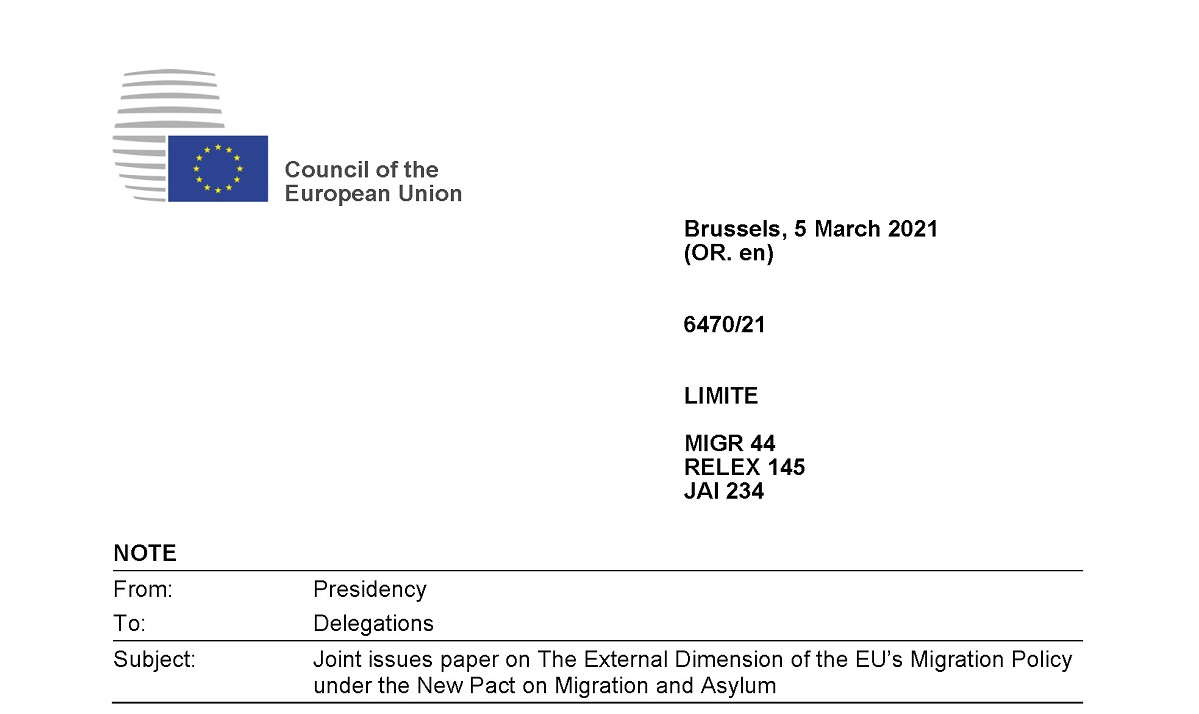EU: Tracking the Pact: Migration obsession drives plans to boost the "external dimension"
Topic
Country/Region
11 March 2021
The Portuguese Council Presidency and the EU's foreign affairs chief have prepared a 'Joint issues paper on The External Dimension of the EU’s Migration Policy under the New Pact on Migration and Asylum', which will be discussed at a joint meeting of EU interior and foreign affairs ministers next week.
Support our work: become a Friend of Statewatch from as little as £1/€1 per month.

See: Joint issues paper on The External Dimension of the EU’s Migration Policy under the New Pact on Migration and Asylum (Council document 6470/21, LIMITE, 5 March 2021, pdf)
The paper is intended to inform discussion at an informal ministerial meeting next week. According to a Council background brief (pdf) on the meeting:
"While no written conclusions are foreseen, the views expressed by member states will be taken into consideration when preparing the next steps in operationalising the concept of mutually beneficial partnerships with third countries."
The 'Joint Issues Paper' makes clear the intention for migration to become a key aspect of relations in all policy areas between the EU, its member states and non-EU states.
It notes that "inevitably, both the EU and our partner countries can have different interests, commitments and priorities, and some elements of migration policy can be politically sensitive, including return and readmission."
Thus, the EU should "mobilise relevant policies and tools including development cooperation, security, visa, education, mobility or trade in order to improve cooperation on migration matters and foster a balanced relationship."
The "carrot and the stick" are back with a vengeance, both underpinned by the goal of reducing migration.
Ministers are asked to consider the following question:
"How do we ensure that migration, in all its relevant aspects, becomes an important and constructive aspect of our overall bilateral relations with the key third countries of origin, transit and destination, in line with the comprehensive approach promoted by the New Pact on Migration and Asylum? Through which policy tools could progress be made and what should the next steps be?"
The second question concerns cooperation and coordination between EU and national institutions and agencies in their relations with non-EU states:
"Full coordination is needed both at the level of the EU (EU institutions and relevant EU Agencies), as well as at national level with relevant Ministries agreeing on common approaches, and between the two levels. Additionally, it is important for both EU external and home affairs actors, at all levels, to speak with one voice."
The paper refers to the diversion of development funds for migration-related objectives, with the new Neighbourhood, Development and International Cooperation Instrument (NDICI) setting aside some 10% for this purposes.
However, other funding resources could be available:
"Team Europe funding initiatives on migration would usefully pool resources from the EU and Member States to achieve common objectives. Spain, for example, has proposed a “Contribution to a Toolbox for Comprehensive Migration Approach in the Maghreb, Sahel and West African Countries”. Other Member States are encouraged to bring their contribution to this Team Europe Initiative or to propose similar migration-related actions in other regions."
It is likely that the use of funding in this way - with resources from both the EU and Member States - would escape the scrutiny of the European Parliament. This would continue the approach taken with the 'EU Trust Fund for Africa', that was used to fund a host of border externalisation projects.
Ministers are asked to discuss the following question:
"How can the EU and its Member States improve their coordination and cooperation in line with the “Team Europe” approach to build effective and mutually beneficial migration partnerships including by mobilising bilateral tools?"
The paper also briefly mentions a new "justice and home affairs partnership with North Africa", on which the Council's background brief provides some more information:
"The Presidency will present elements of a proposal for a comprehensive dialogue on justice and home affairs with partner countries in North Africa. The initiative will focus on enhancing operational cooperation with a number of North African partners and is in line with the renewed partnership with the Southern neighbourhood. It covers a comprehensive range of topics such as migration, mobility and border management, security, serious and organised crime, data protection, cybercrime and cybersecurity, police and judicial cooperation, democracy, rule of law and fundamental rights."
See: Joint issues paper on The External Dimension of the EU’s Migration Policy under the New Pact on Migration and Asylum (Council document 6470/21, LIMITE, 5 March 2021, pdf)
Note: this article was updated on 12 March 2021 to include the point about European Parliament scrutiny of pooled EU/member state funds.
Our work is only possible with your support.
Become a Friend of Statewatch from as little as £1/€1 per month.
Spotted an error? If you've spotted a problem with this page, just click once to let us know.

